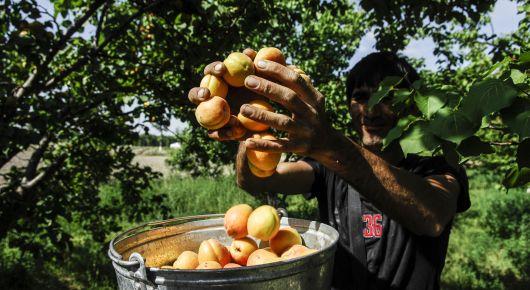Central Asian countries pledge for more sustainability in agriculture

Cultivating the land and raising livestock means survival and even life for millions of people living in rural areas of Central Asia. Today, the agricultural ministers of Central Asian countries expressed their commitment to ensure more sustainability in agriculture through improved natural resource management.
The virtual meeting, organized by FAO and Turkmenistan’s Ministry of Agriculture and Environmental Protection, helped Kazakhstan, Kyrgyzstan, Tajikistan, Turkmenistan, and Uzbekistan to better understand how integrated natural resource management contributes to agricultural sustainability. The participating ministers discussed this concept to find a common understanding and learn about FAO tools, initiatives, and projects that support its realization.
In the past decades, several factors have hampered green agricultural development, including manmade processes (input intensive agricultural growth) and climate change-induced dynamics (soil erosion and degradation, drought). Land, water, and biodiversity are finite resources and thus need to be better protected to make agricultural production possible for future generations.
To this end, Central Asian ministers of agriculture also shared a few practices as good examples for uniting the interest of the people, economy, and environment, and made recommendations for new public policies that promote agricultural sustainability through integrated natural resource management.
“Providing a socially, environmentally, and economically sustainable future for our children’s and grandchildren’s generations is a worldwide objective, framed by the Sustainable Development Goals. What we are seeing today at this meeting is how these global targets are being translated into local and regional initiatives,” said Vladimir Rakhmanin, FAO Assistant Director-General and Regional Representative. “One thing is obvious: Central Asia is committed to play its part.”
Yet, there is no single path leading to sustainability.
FAO offers several alternative methods to resource intensive farming practices that help balance out productivity enhancement, environmental protection, and social wellbeing. These approaches include agroecology, which builds on traditional knowledge, and integrated natural resource management, which is already setting its foot in the region thanks to a GEF-funded FAO project that is being implemented in drought-prone and salt-affected agricultural production systems in Central Asia and Turkey.
To further enrich the discussion and help knowledge-sharing, representatives of other UN agencies and international financial institutions also participated in the fifth virtual meeting of the Central Asian agricultural ministers.
1 March 2022, Budapest, Hungary
